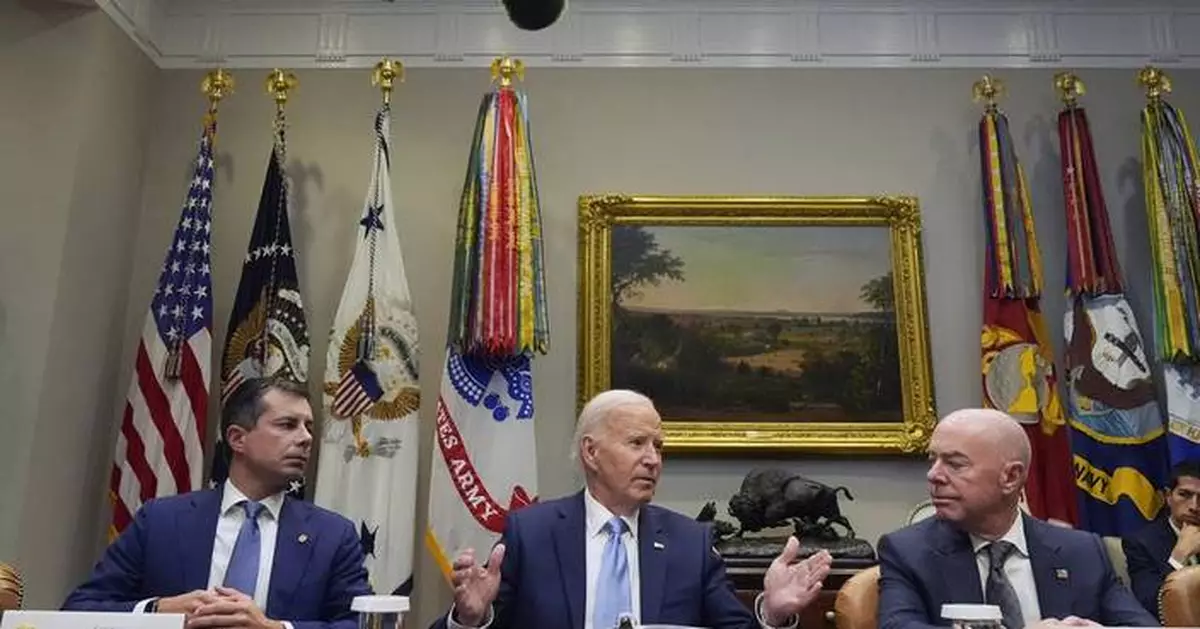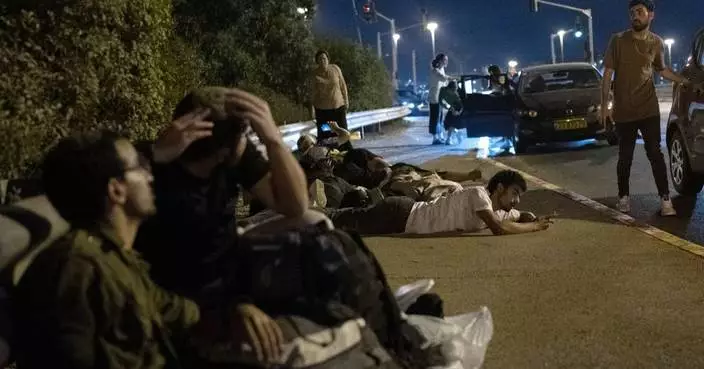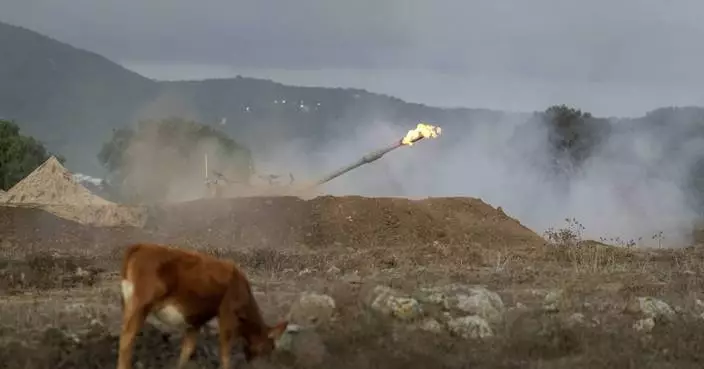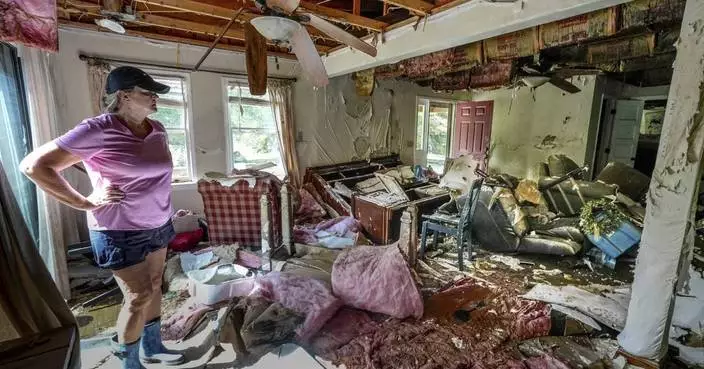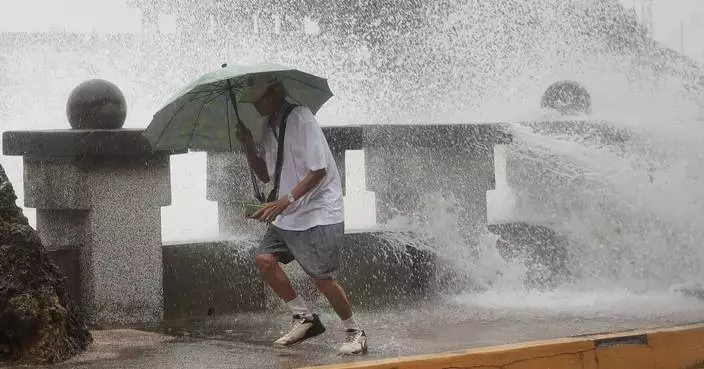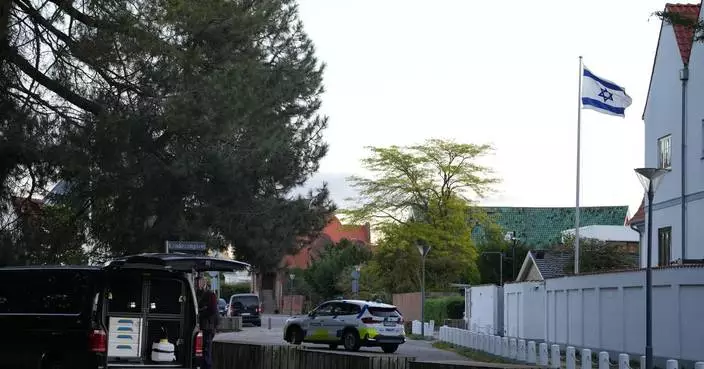WASHINGTON (AP) — Over the past four years, President Joe Biden has jetted off to survey damage and console victims after tornadoes, wildfires and tropical storms. It's not a role that Kamala Harris has played as vice president.
But on Wednesday, they will both fan out across the Southeast to grapple with the damage from Hurricane Helene, seeking to demonstrate commitment and competence in helping devastated communities after Donald Trump’s false claims about their administration’s response. Biden is heading to North and South Carolina, while Harris is going to Georgia.
Harris' stop will also serve as a political test in the midst of a humanitarian crisis. She's trying to step into the role for which Biden is best known — showing the empathy that Americans expect in times of tragedy — in the closing stretch of her campaign for president.
She last visited scenes of natural disasters as a senator from California, including when she went to Puerto Rico after Hurricane Maria in 2017 and when she walked through charred wreckage in Paradise, California, after the Camp Fire in 2018.
Trump, the Republican nominee, traveled to Valdosta, Georgia, on Monday with a Christian charity organization that brought trucks of fuel, food, water and other supplies.
After arriving, Trump accused Biden of “sleeping” and not responding to calls from Gov. Brian Kemp, R-Ga. However, Kemp had spoken with Biden the previous day, and the governor said the state was getting everything it needed.
Biden was infuriated by Trump’s claim, saying Trump was “lying, and the governor told him he was lying.”
On Tuesday, the president said he has directed administration officials to “send every available resource” to communities harmed by Helene. The death toll approached 160 people, and power and cellular service remains unavailable in some places.
“We have to jumpstart this recovery process," he said. “People are scared to death. This is urgent.”
The president is flying into to Greenville, South Carolina, and will view storm fallout from the air before heading to Raleigh, North Carolina, for a briefing.
Trump claimed without evidence that Democratic leaders were withholding help from Republican areas, an accusation that better describes his own approach to disaster relief. He recently threatened that he would withhold wildfire assistance from California because of disagreements with Democratic Gov. Gavin Newsom.
When Trump was president, Puerto Rico was devastated by Hurricane Maria, which killed 3,000 people. His administration waited until the fall of 2020, just weeks before the presidential election, to release $13 billion in assistance for Puerto Rico’s recovery. A federal government watchdog also found that Trump administration officials hampered an investigation into delays in the aid delivery.
And during a visit there, he was criticized for tossing paper towel rolls to survivors at a relief center. The gesture seemed to go over well in the room but was widely panned as insensitive to those who were suffering. He also questioned whether the death toll was accurate, claiming it rose “like magic.”
Harris visited Puerto Rico after Maria as part of a bipartisan delegation.
“When disaster hits anywhere in America, our government has a basic responsibility to commit the resources necessary to save lives, accurately assess damage, and rebuild communities," she wrote on Twitter in 2018. "We now know that after Hurricane Maria, our government failed Puerto Rico at every level.”
Last month, on the seventh anniversary of Maria, Harris recalled speaking with Puerto Ricans who had lost businesses and homes.
“They didn’t need paper towels thrown at them — they needed real help and partnership,” she said.
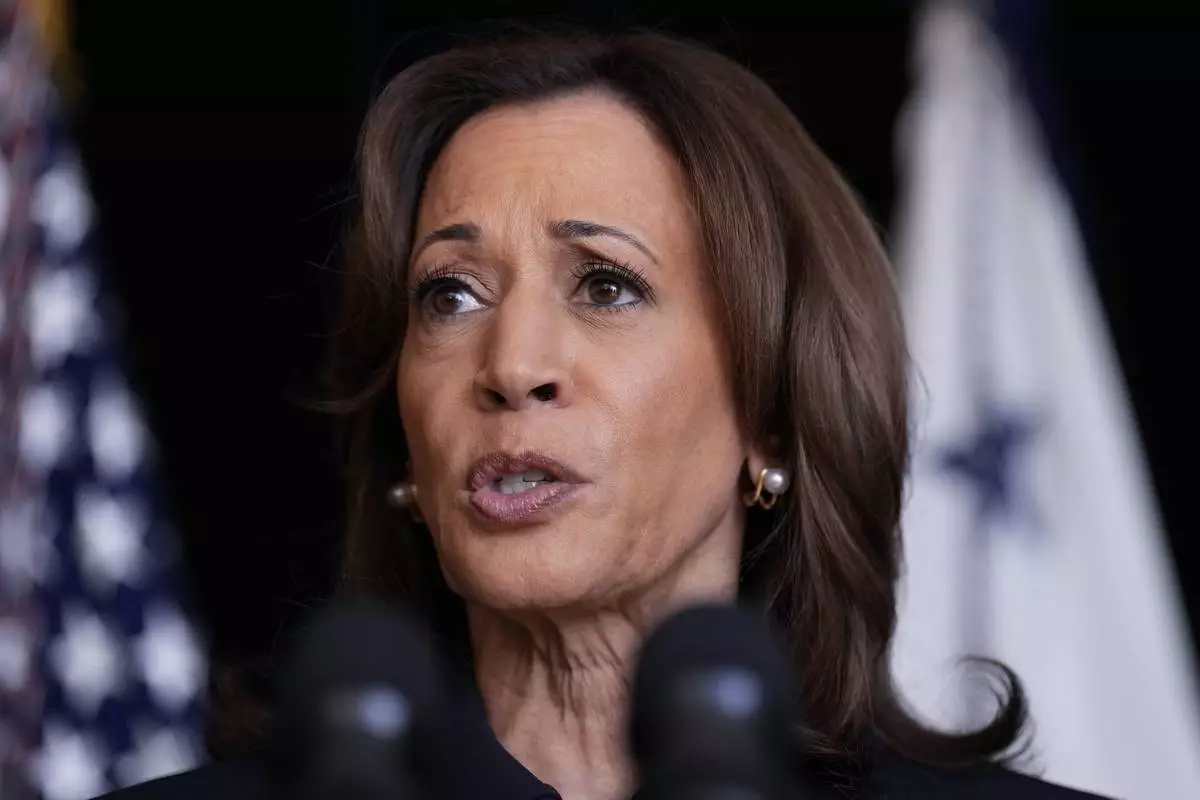
Democratic presidential nominee Vice President Kamala Harris speaks to members of the media, Tuesday Oct. 1, 2024, in Washington. (AP Photo/Jacquelyn Martin)
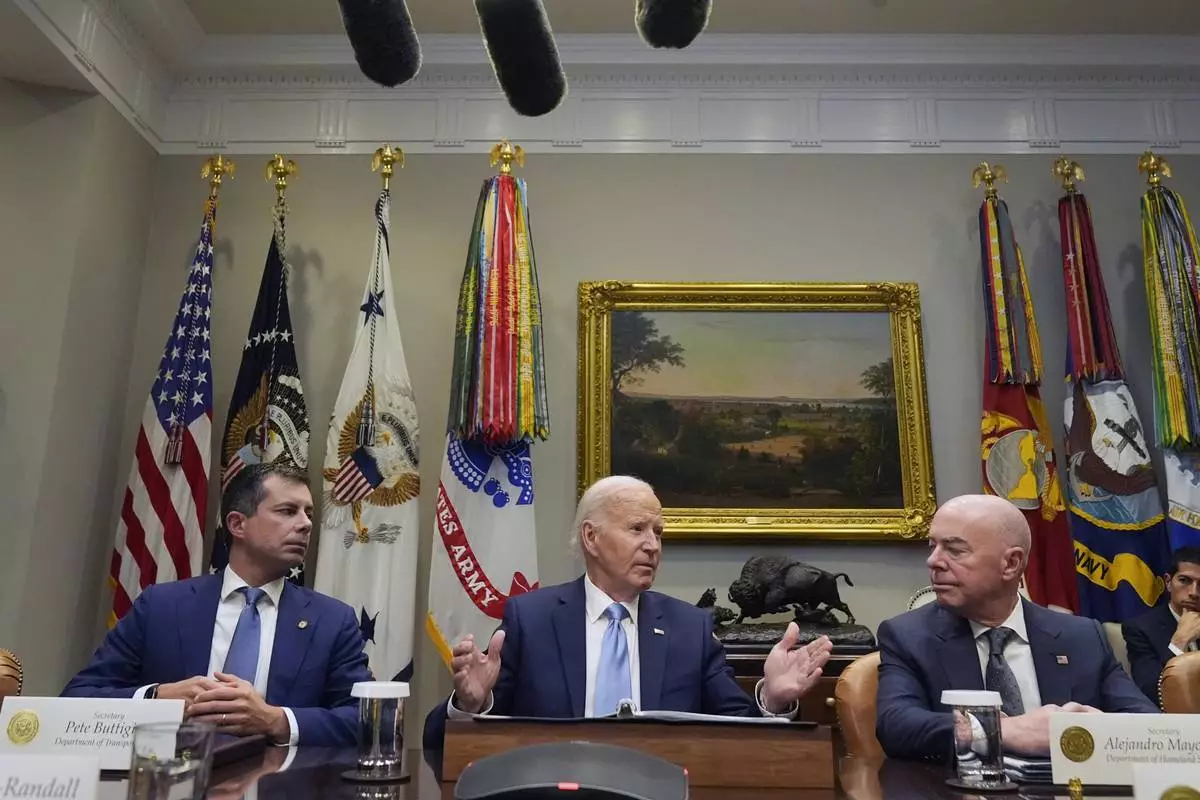
President Joe Biden speaks during a briefing on the government's response to Hurricane Helene in the Roosevelt Room of the White House in Washington, Tuesday, Oct. 1, 2024, as Secretary of Transportation Pete Buttigieg, left, and Secretary of Homeland Security Alejandro Mayorkas, right, look on. (AP Photo/Mark Schiefelbein)
SAN FRANCISCO (AP) — Cabrel Ngounou's life in Cameroon quickly unraveled after neighbors caught the teenager with his boyfriend.
A crowd surrounded his boyfriend's house and beat him. Ngounou's family learned of the relationship and kicked him out. So Ngounou fled — alone and with little money — on a dangerous, four-year journey through at least five countries. He was sexually assaulted in a Libyan prison, harassed in Tunisia and tried unsuccessfully to take a boat to Europe.
"The worst thing was that they caught us. So it was not easy for my family," Ngounou said. “My sisters told me I need to get out of the house because my place is not there. So that’s what really pushed me to leave my country.”
Ngounou's troubles drew attention after he joined a protest outside the U.N. refugee agency's Tunisia office. Eventually, he arrived in the United States, landing in San Francisco in March.
Ngounou joined a growing number of LGBTQ+ people accepted into the Welcome Corps, which launched last year and pairs groups of Americans with newly arrived refugees. So far, the resettlement program has connected 3,500 sponsors with 1,800 refugees, and many more want to help: 100,000 people have applied to become sponsors.
President Joe Biden has sought to rebuild the refugee programs Donald Trump largely dismantled as president, working to streamline the process of screening and placing people in America. New refugee resettlement sites have opened across the country, and on Tuesday, the Biden Administration announced that it resettled 100,000 refugees in fiscal year 2024, the largest number in more than three decades.
In contrast, Trump has pledged to bar refugees from Gaza, reinstate his Muslim ban and impose “ideological screening” for all immigrants if he regains the presidency. He and running mate JD Vance are laying groundwork for their goal of deporting millions of illegal immigrants by amplifying false claims, such as the accusation that Haitians given temporary protected status to remain in the U.S. legally are eating pets in Ohio.
Under Biden, meanwhile, two human rights officials in the State Department were tasked last year with identifying refugees who face persecution either due to their sexual orientation or human rights advocacy.
“LGBTQ refugees are forced to flee their homes due to persecution and violence, not unlike other people,” said Jeremy Haldeman, deputy executive director of the Community Sponsorship Hub, which implements the Welcome Corps on behalf of the State Department. But they are particularly vulnerable because they're coming from places "where their identities are criminalized and they are at risk of imprisonment or even death.”
More than 60 countries have passed anti-LGBTQ laws and thousands of people have fled the Middle East and Africa seeking asylum in Europe. In April, Uganda’s constitutional court on Wednesday upheld an anti-gay law that allows the death penalty for “aggravated homosexuality.”
“There are just a lot of people who are really at risk and are not safe in their country, and they’re usually not safe in the neighboring or regional countries either,” Kathryn Hampton, senior adviser for U.S. Strategy at Rainbow Railroad, which helps LGBTQI+ people facing persecution.
The demand far outstrips capacity: Of more than 15,000 requests for help in 2023, the nonprofit helped resettle 23 refugees through the Welcome Corps program in cities as large as Houston and towns as small as Arlington, Vermont. It has a goal of resettling 50 this year.
"So, we have a lot of urgency as an organization to find and create new pathways that LGBTQI+ people can access to find safety,” Hampton said.
Another refugee in the program, Julieth Luna Garcia, is a transgender woman from El Salvador who settled in Chicago.
Speaking through a translator, the 31-year-old Garcia said she suffered abuse from her family because of her trans identity and couldn't legally access gender-affirming care until she arrived in the United States.
"I lived with constant fear, even more so at night. I didn’t like to go out. I was really scared that somebody would find me alone and do something,” Garcia said. Since arriving in February, Garcia has found a place to live and a job as a home health aide and hopes to study to become a lawyer. "Here, I’m not scared to say who I am. I’m not scared to tell anyone," she said.
Maybe the biggest change was starting hormone treatments, she said: “To see yourself in the mirror and see these changes, I can’t really explain it, but it’s really big. It’s an emotional and exciting thing and something I thought I would never experience.”
Welcome Corps sponsors are expected to help refugees adjust for at least three months after they arrive. Garcia said the five volunteers helped her “adapt to a new life with a little less difficulty,” by accessing benefits, getting a work permit and enrolling in English classes.
Ngounou recalled how his sponsors, a team of seven that included a lesbian couple, Anne Raeff and Lori Ostlund, hosted him and connected him with LGBTQ resources and a work training program. They also served as his tour guides to gay life, taking him to the historically gay Castro district, where Ngounou got his first glimpse of the huge rainbow Pride flag and stopped to read every plaque honoring famous gay people.
“Cabrel was just very, very moved by that. Just kind of started crying. We all did,” Raeff recalled.
“I know that feeling like when we were young, when you’d go into a gay bar and you’d feel like this sense of kind of freedom, like this community,” she said. “That was the only place where you could go and actually be open. And that ... this is this community of people and we all have this in common.”
Now the 19-year-old Ngounou works in a coffee shop and takes college courses, with the goal of becoming a social worker. He hopes the boyfriend he met in Tunisia can visit him in San Francisco — and he still finds it hard to believe that they can share their love openly.
“Here I’m really me ... I feel free,” he said with a laugh. "I feel free to have my boyfriend and walk with him in the street. I feel free, you know, to enjoy myself with him wherever we want to enjoy ourselves. But in Tunisia or anywhere else, in Cameroon, you have to hide such things.”

Julieth Luna Garcia, a transgender woman from El Salvador, looks into a compact mirror at Horner Park in Chicago, Monday, Sept. 30, 2024. (AP Photo/Nam Y. Huh)
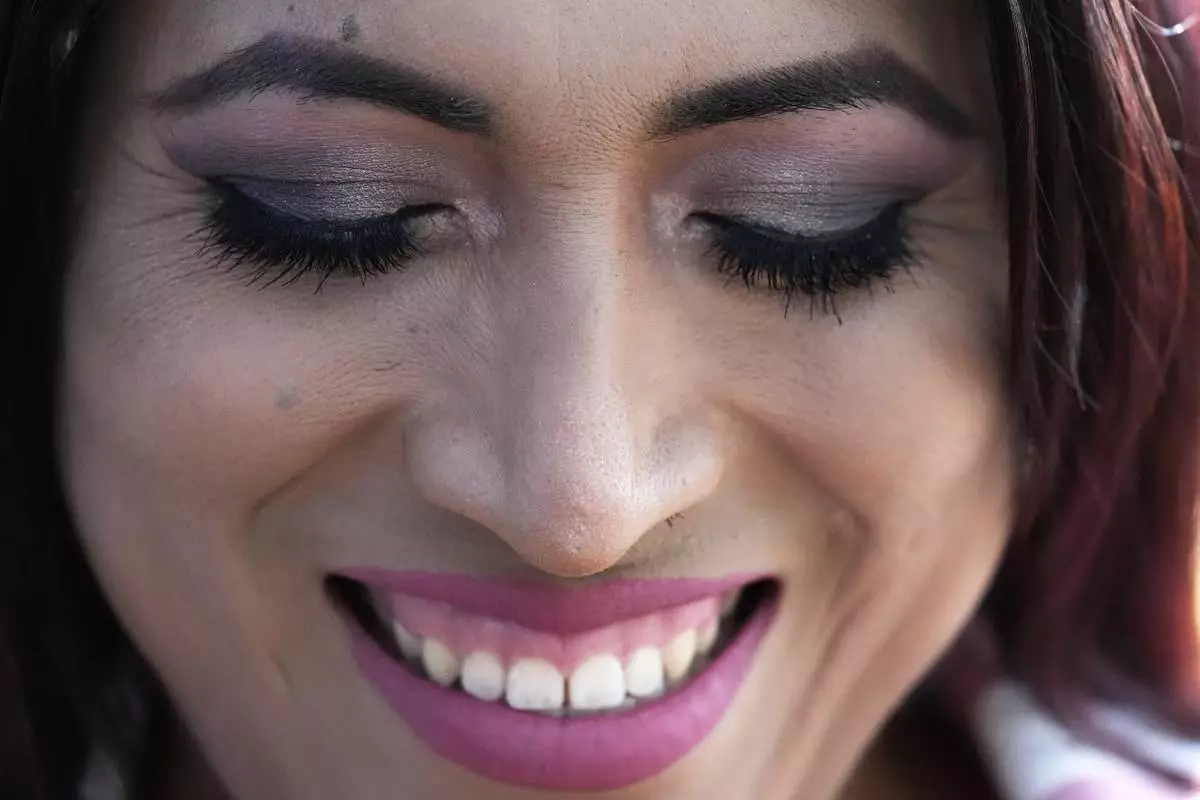
Julieth Luna Garcia, a transgender woman from El Salvador, smiles as she listens to Drew Heckman from Rainbow Railroad at Horner Park in Chicago, Monday, Sept. 30, 2024. (AP Photo/Nam Y. Huh)
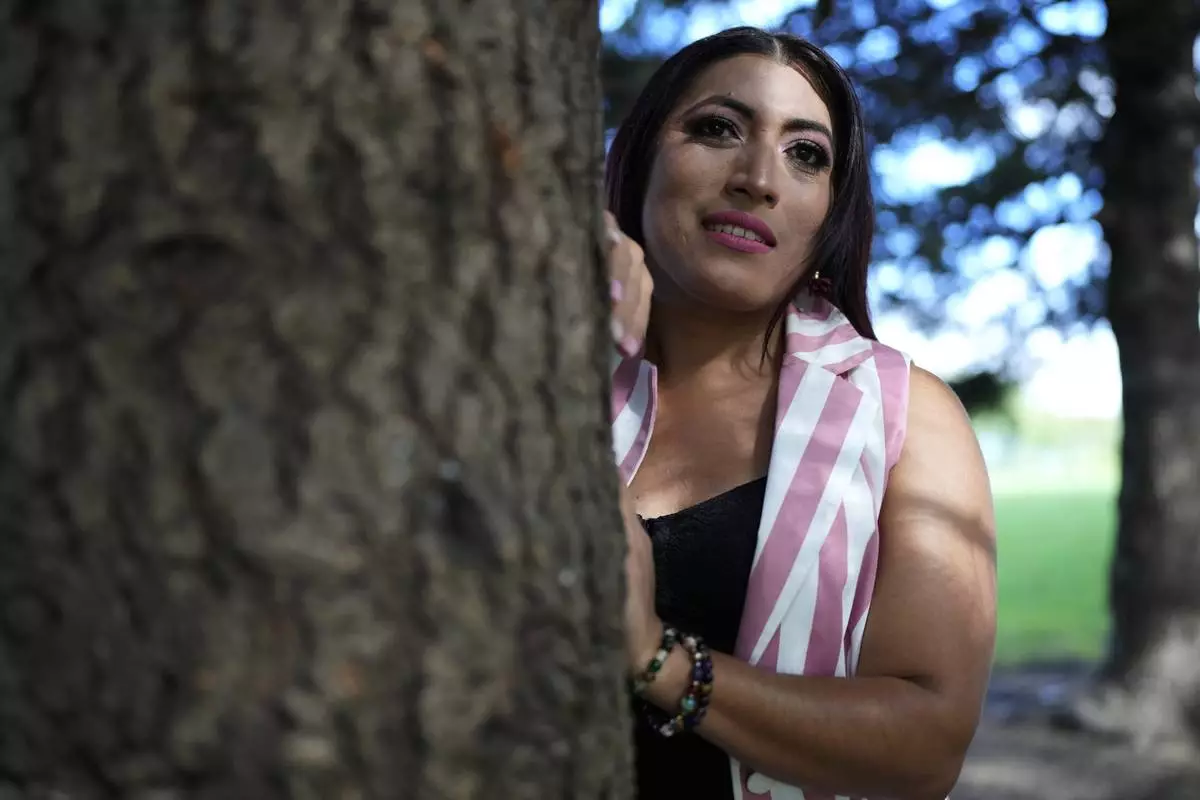
Julieth Luna Garcia, a transgender woman from El Salvador, poses for photos at Horner Park in Chicago, Monday, Sept. 30, 2024. (AP Photo/Nam Y. Huh)
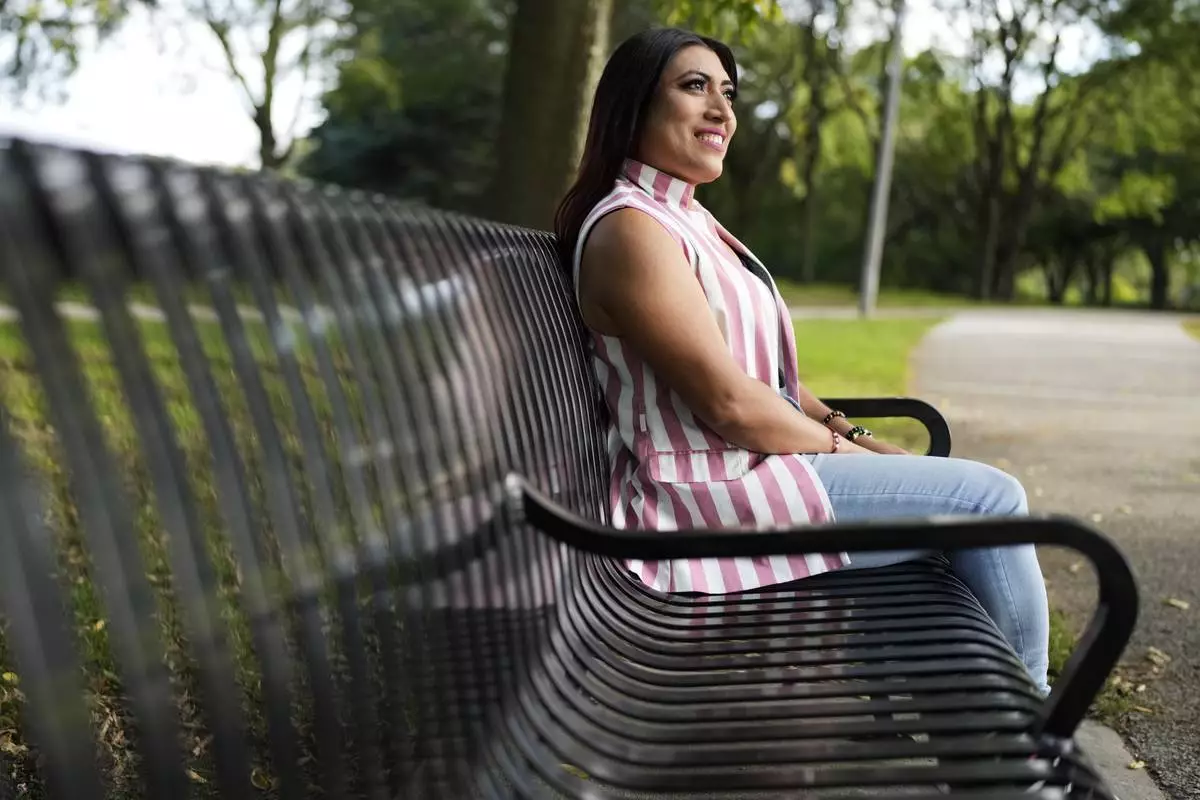
Julieth Luna Garcia, a transgender woman from El Salvador, sits on a bench as she looks at trees at Horner Park in Chicago, Monday, Sept. 30, 2024. (AP Photo/Nam Y. Huh)
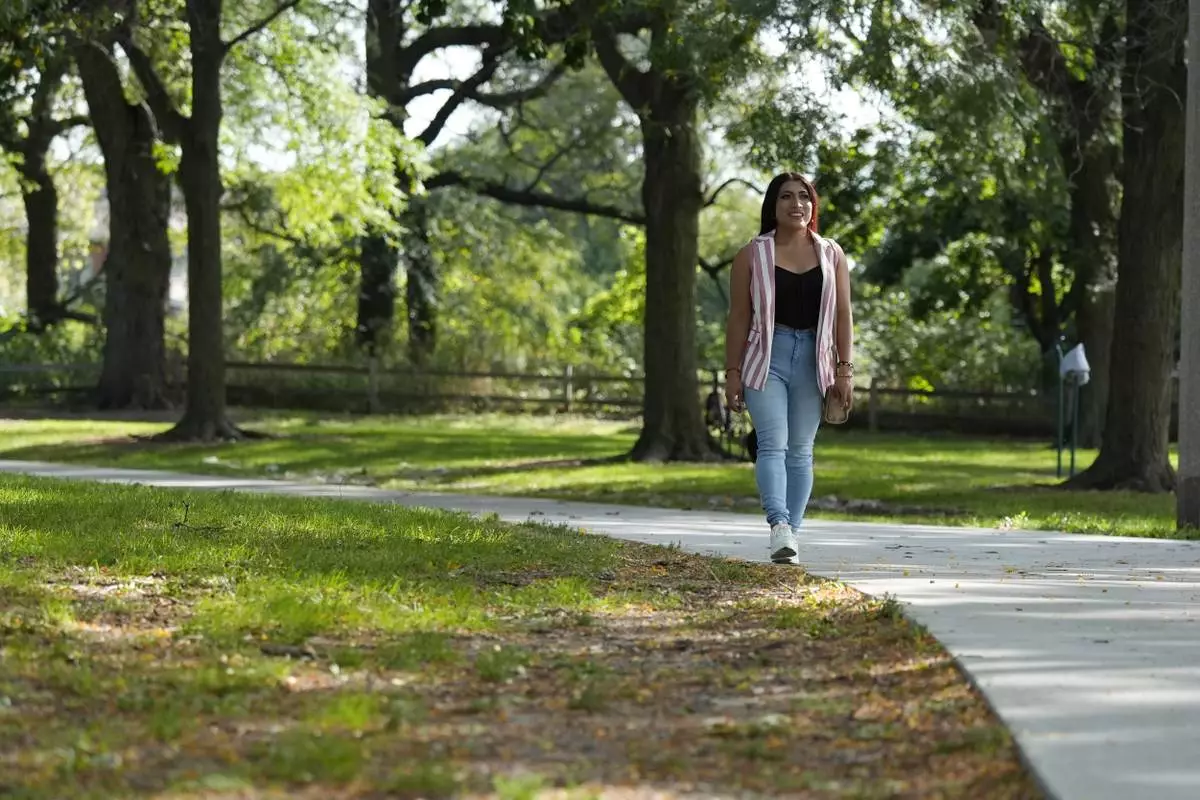
Julieth Luna Garcia, a transgender woman from El Salvador, takes a walk at Horner Park in Chicago, Monday, Sept. 30, 2024. (AP Photo/Nam Y. Huh)
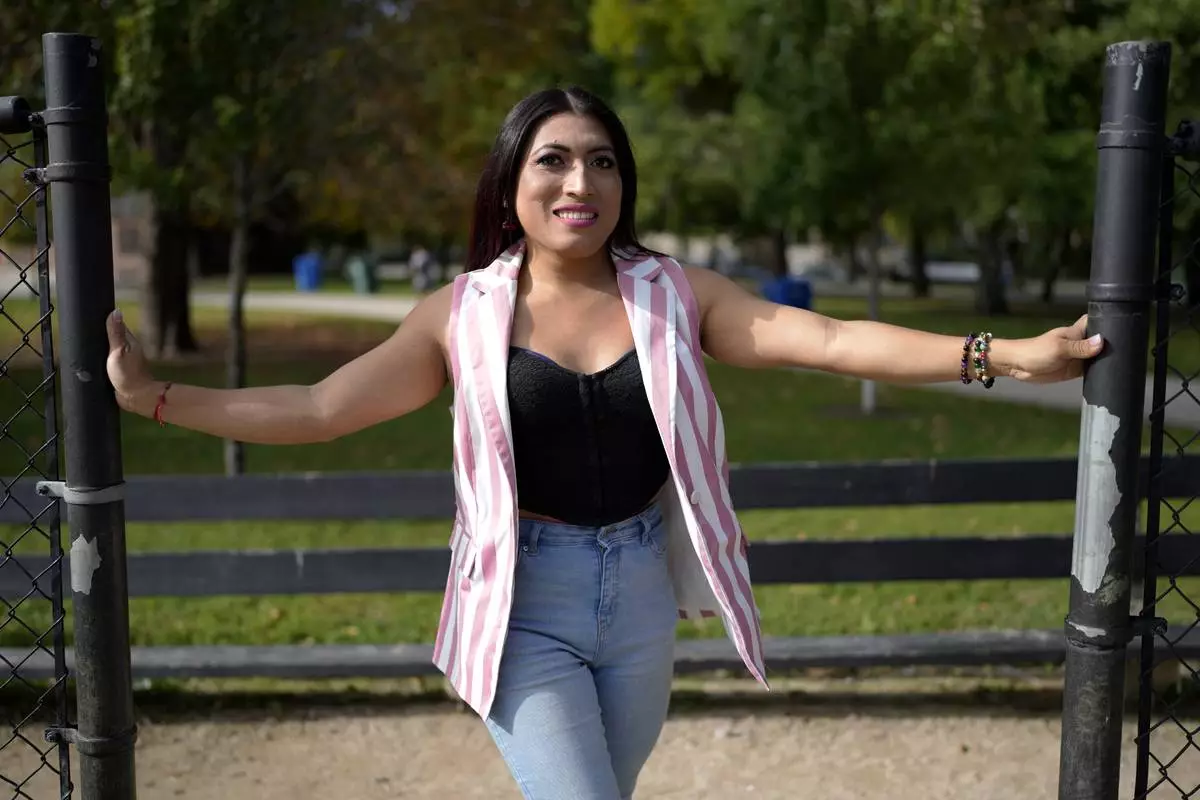
Julieth Luna Garcia, a transgender woman from El Salvador, poses for photos at Horner Park in Chicago, Monday, Sept. 30, 2024. (AP Photo/Nam Y. Huh)
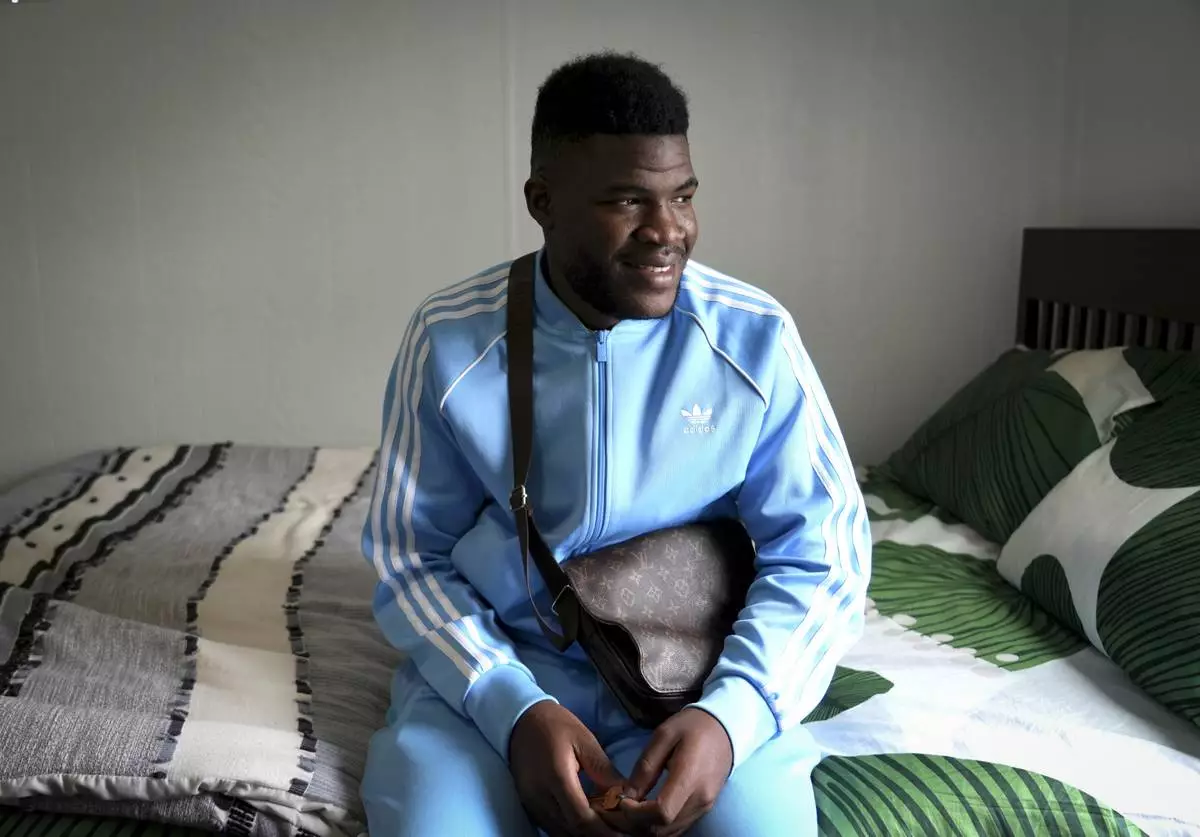
CORRECTS SPELLING OF LAST NAME Cabrel Ngounou, a refugee from Cameroon, poses for a photo in San Francisco, Tuesday, Sept. 17, 2024. (AP Photo/Terry Chea)
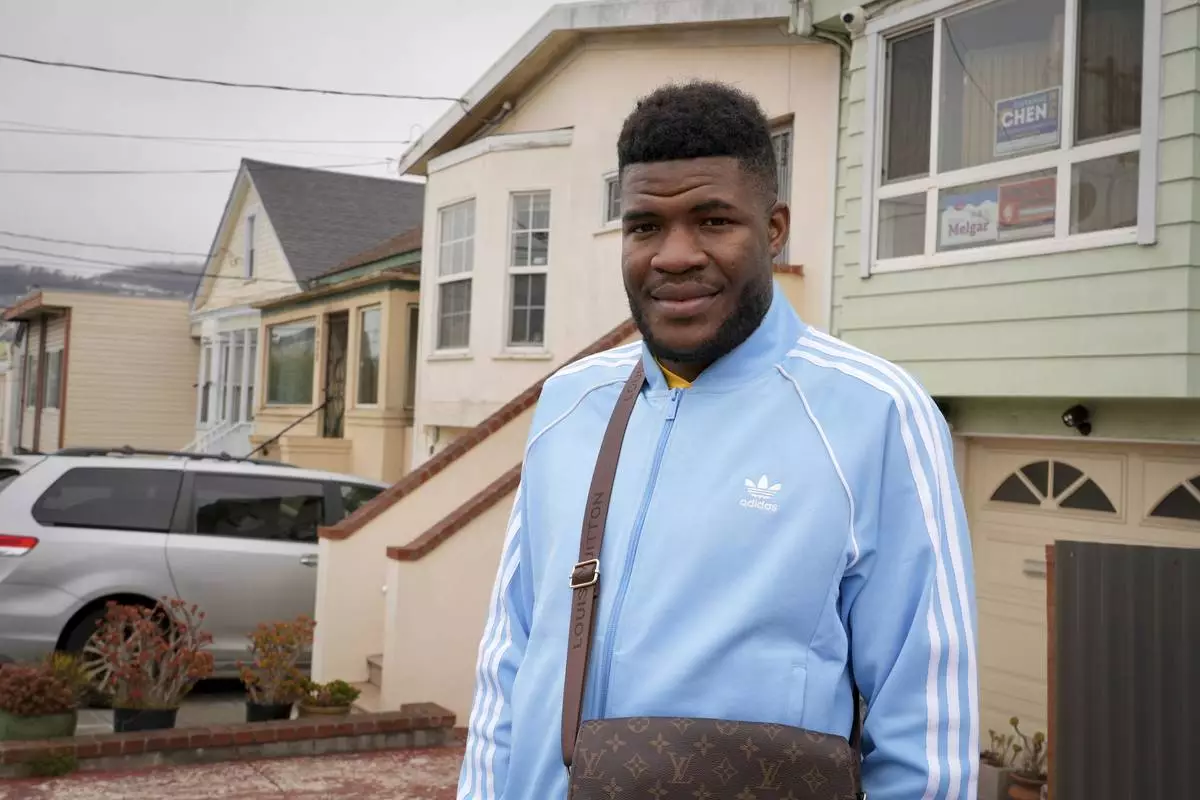
CORRECTS SPELLING OF LAST NAME Cabrel Ngounou, a refugee from Cameroon, poses for a photo in San Francisco, Tuesday, Sept. 17, 2024. (AP Photo/Terry Chea)
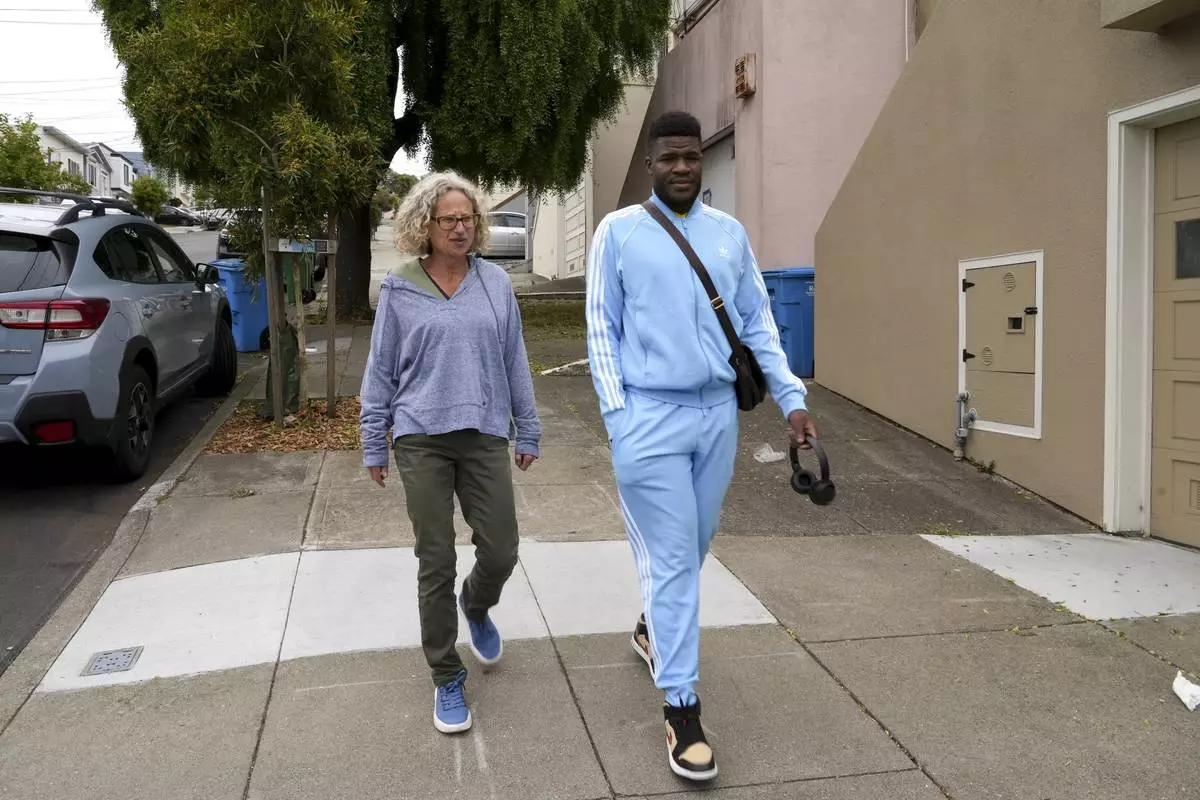
CORRECTS SPELLING OF LAST NAME Cabrel Ngounou, right, a refugee from Cameroon, walks with his sponsor Anne Raeff, in San Francisco, Tuesday, Sept. 17, 2024. (AP Photo/Terry Chea)
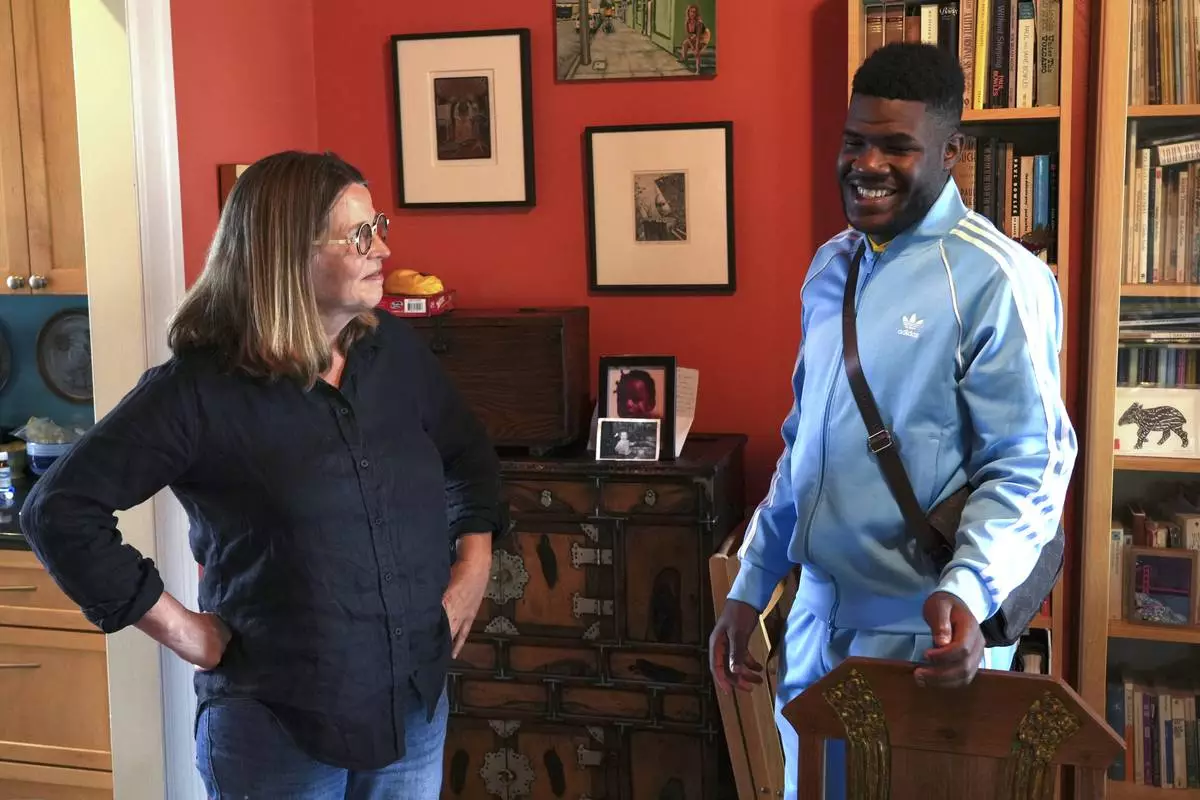
CORRECTS SPELLING OF LAST NAME Cabrel Ngounou, right, a refugee from Cameroon, talks with his sponsor Lori Ostlund in her home in San Francisco, Tuesday, Sept. 17, 2024. (AP Photo/Terry Chea)
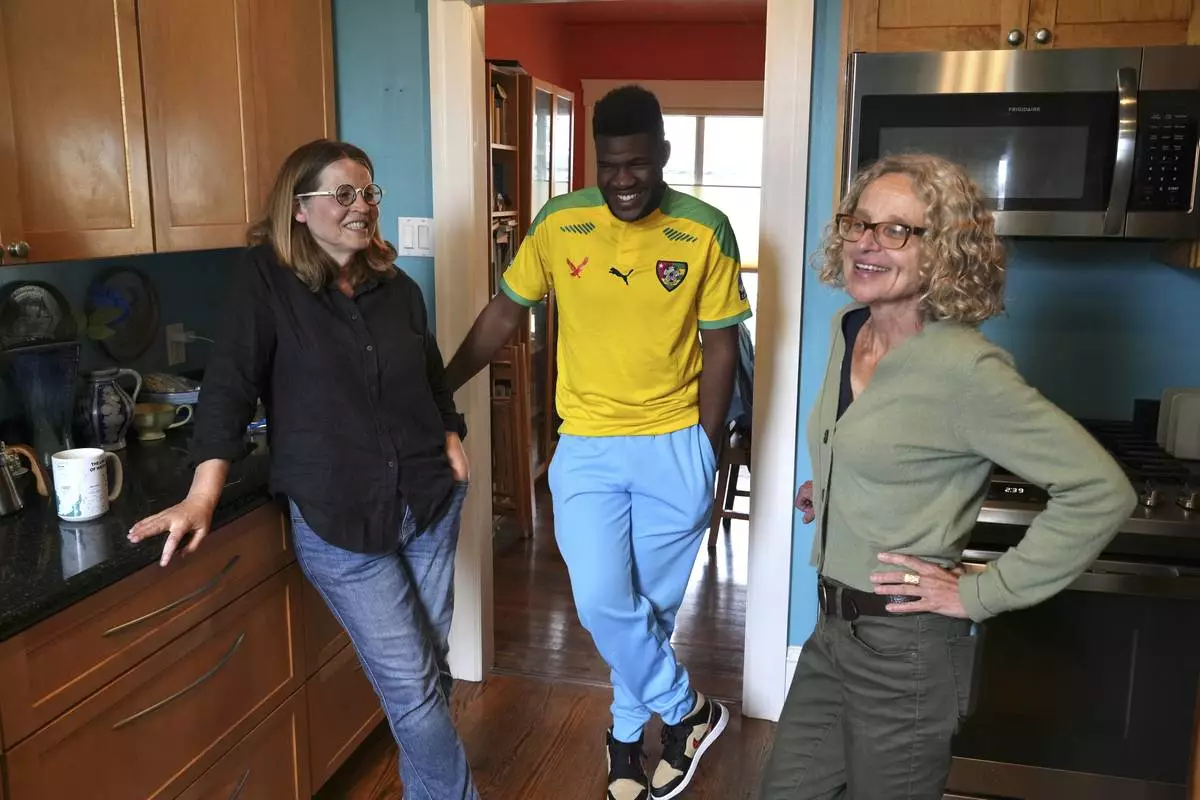
CORRECTS SPELLING OF LAST NAME Cabrel Ngounou, center, a refugee from Cameroon, talks with his sponsors Lori Ostlund, left, and Anne Raeff in their home in San Francisco, Tuesday, Sept. 17, 2024. (AP Photo/Terry Chea)




